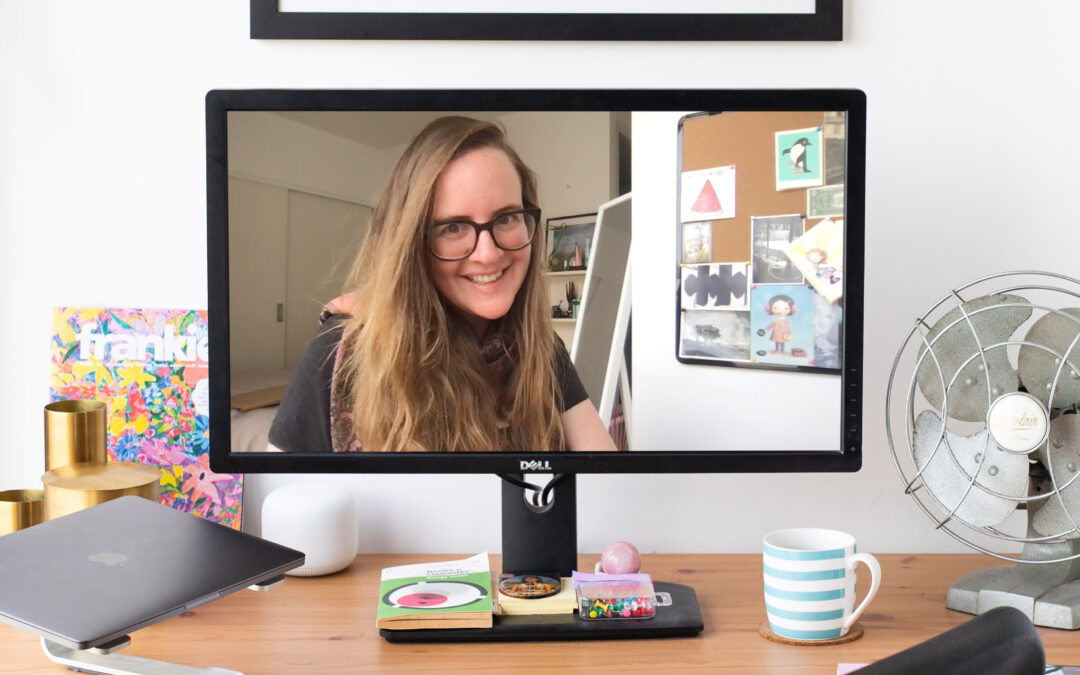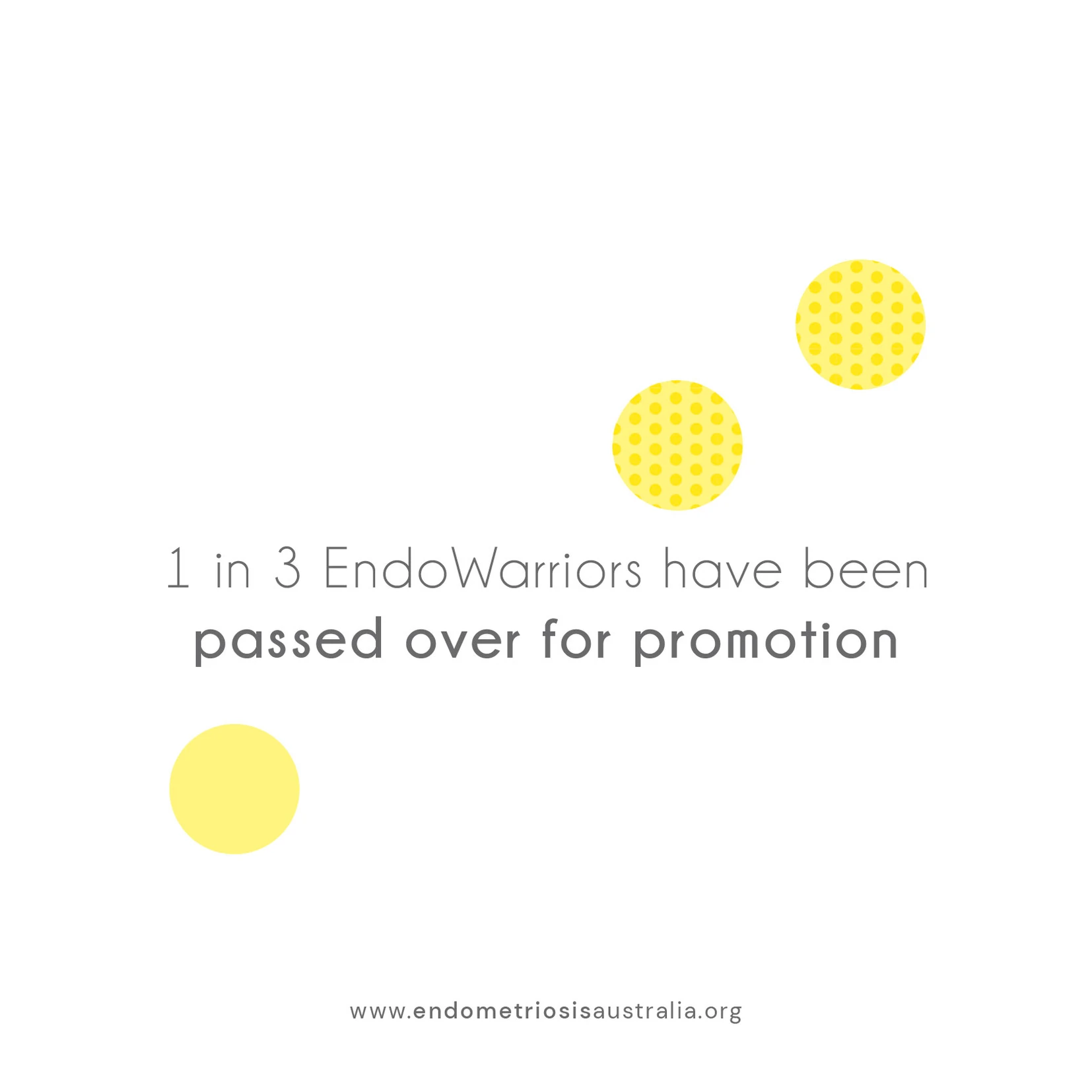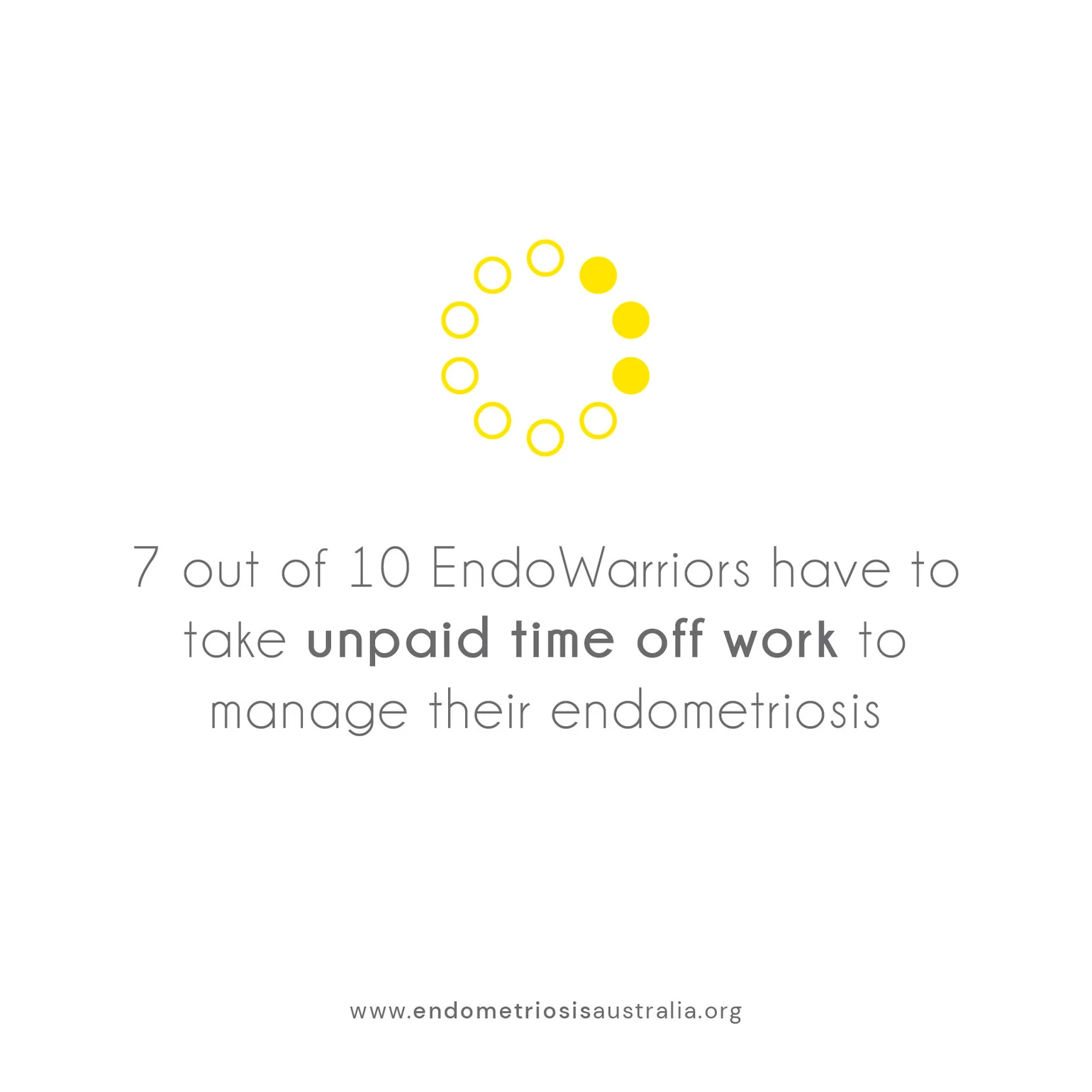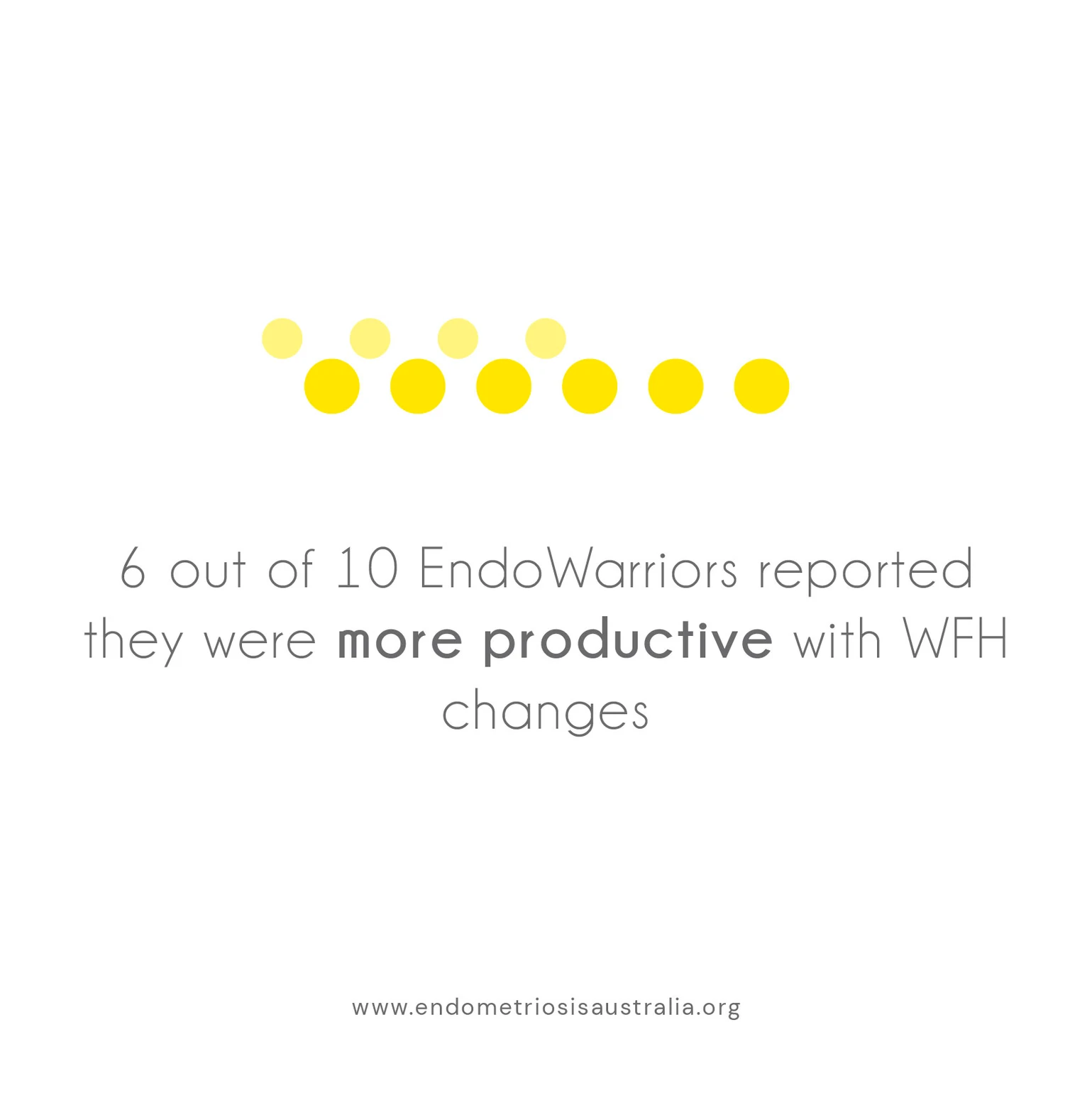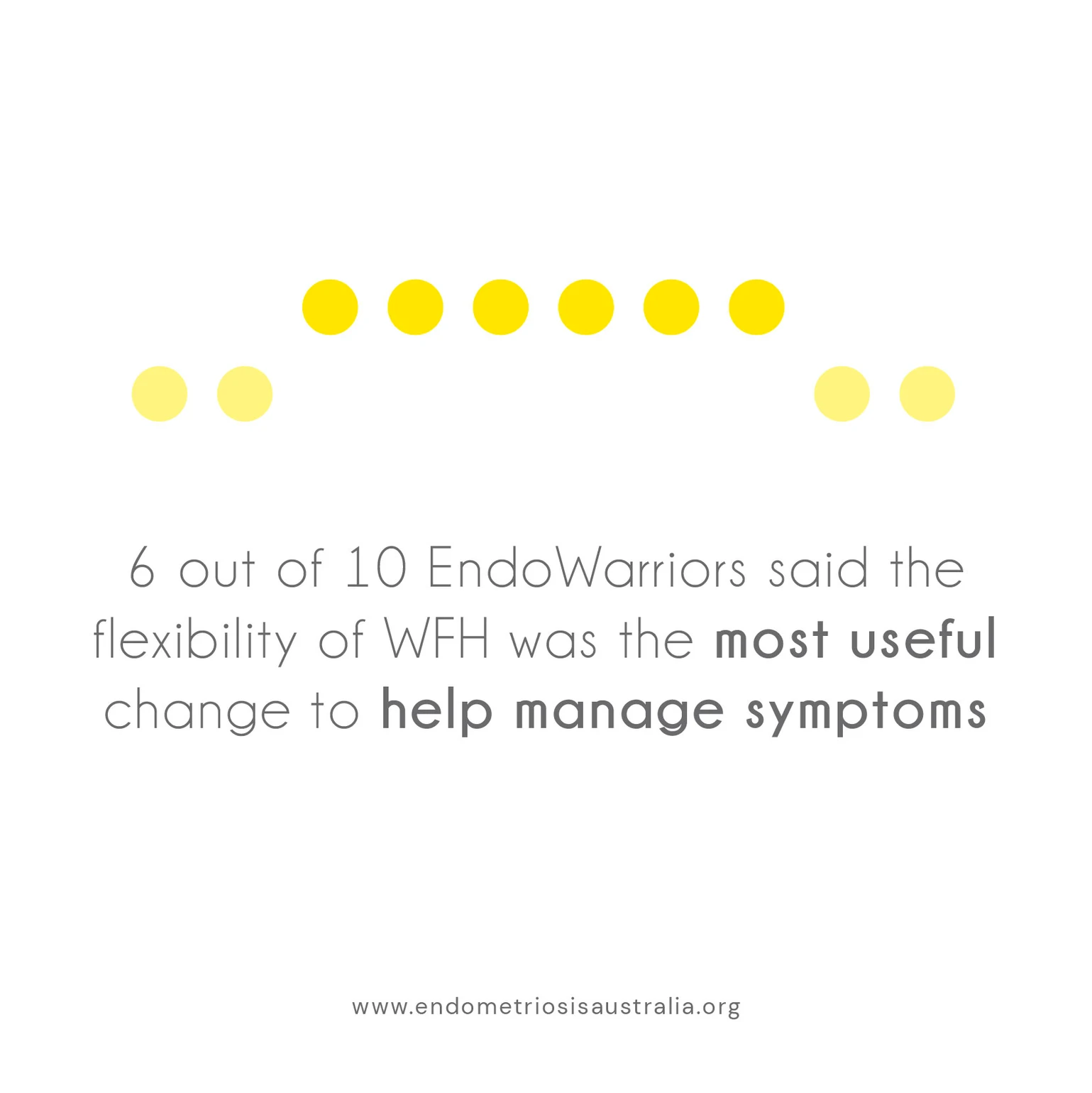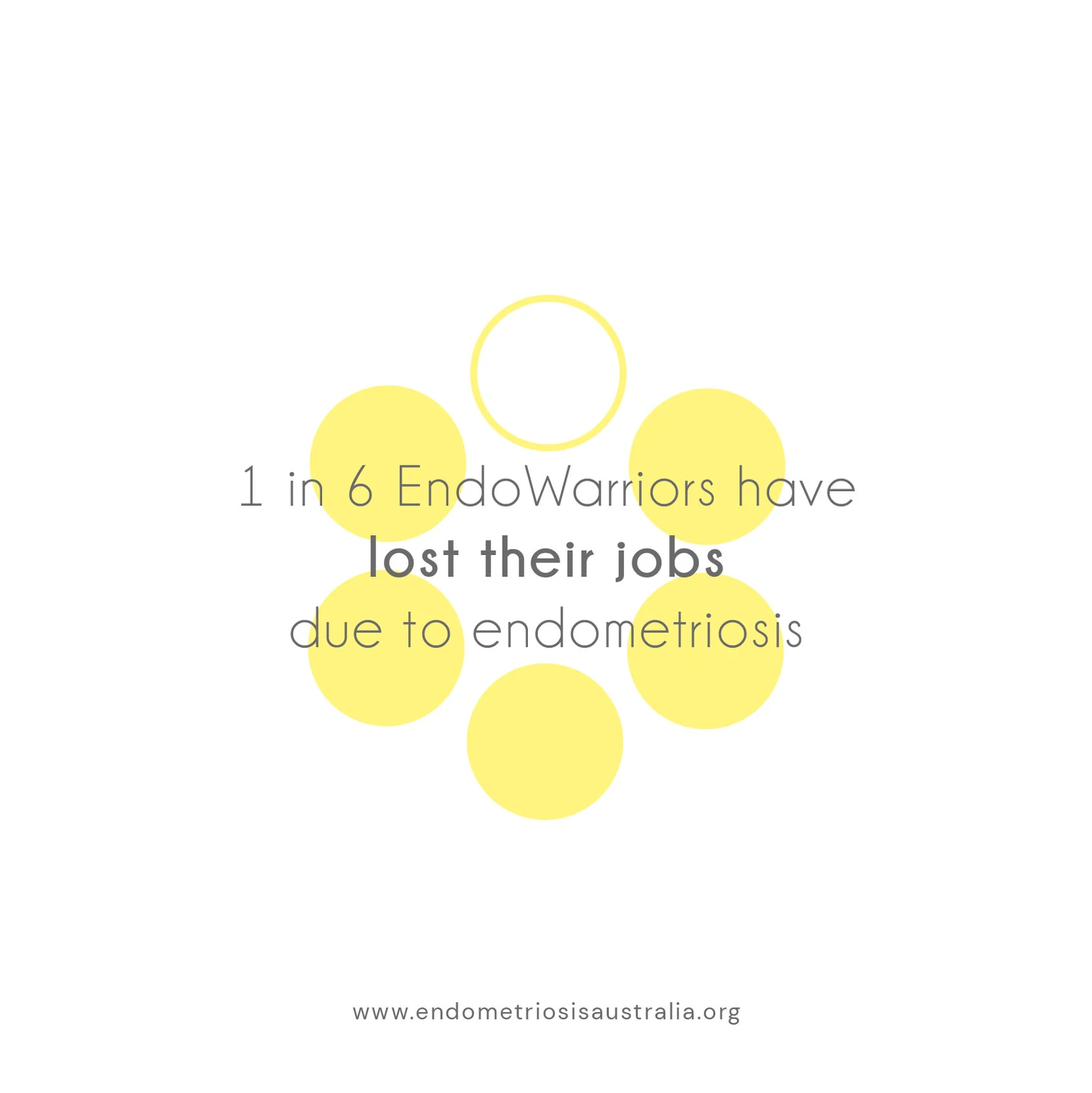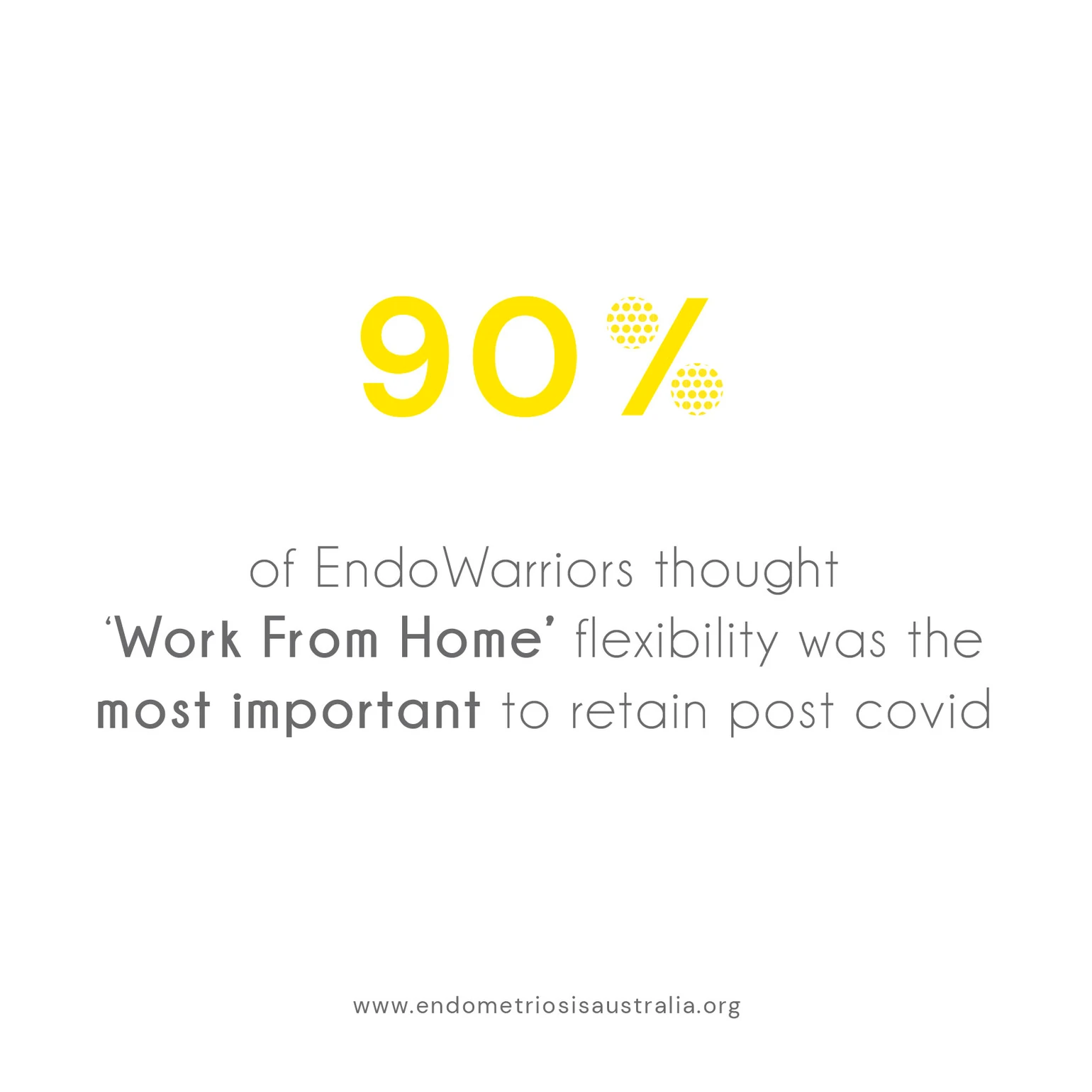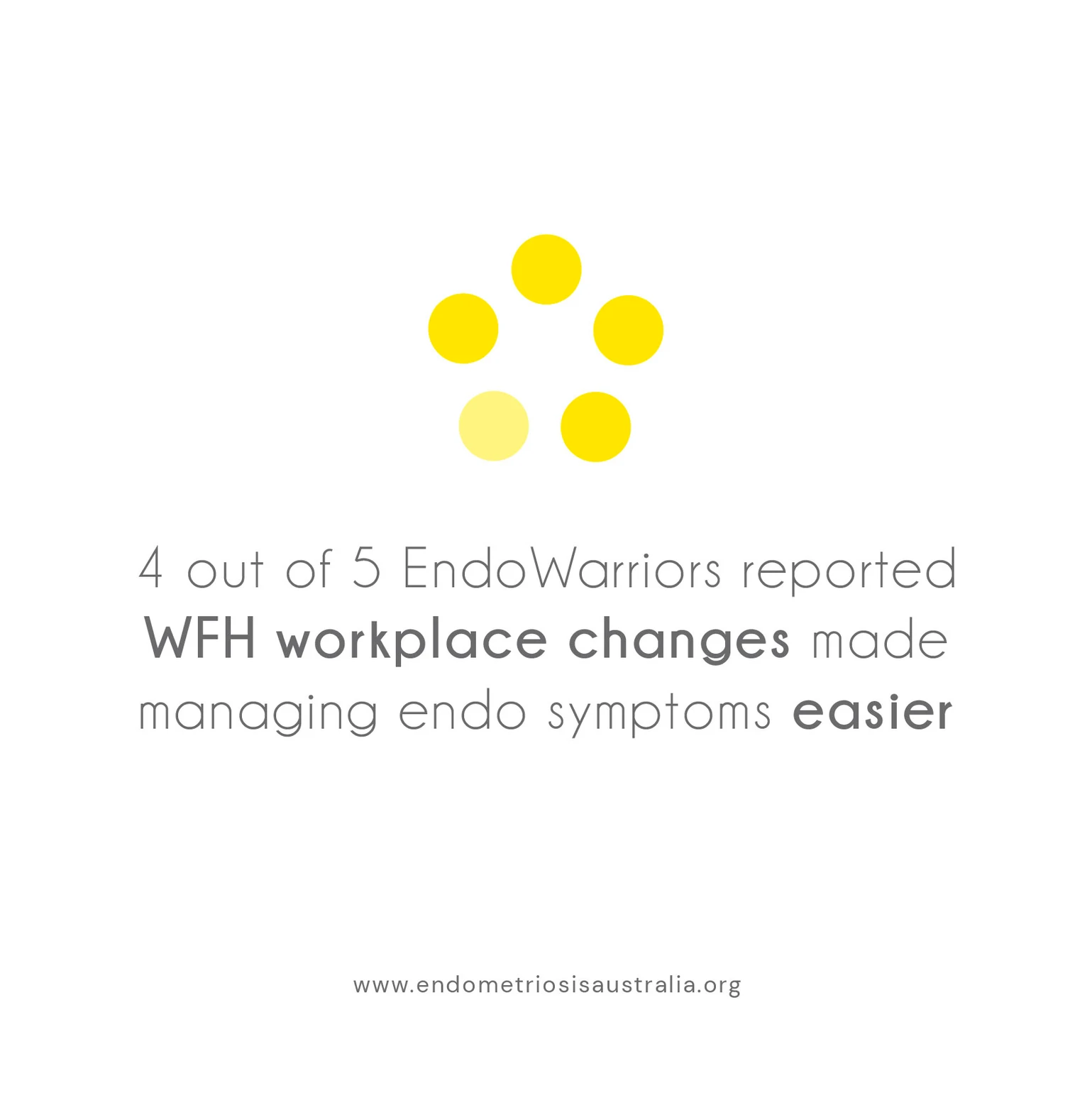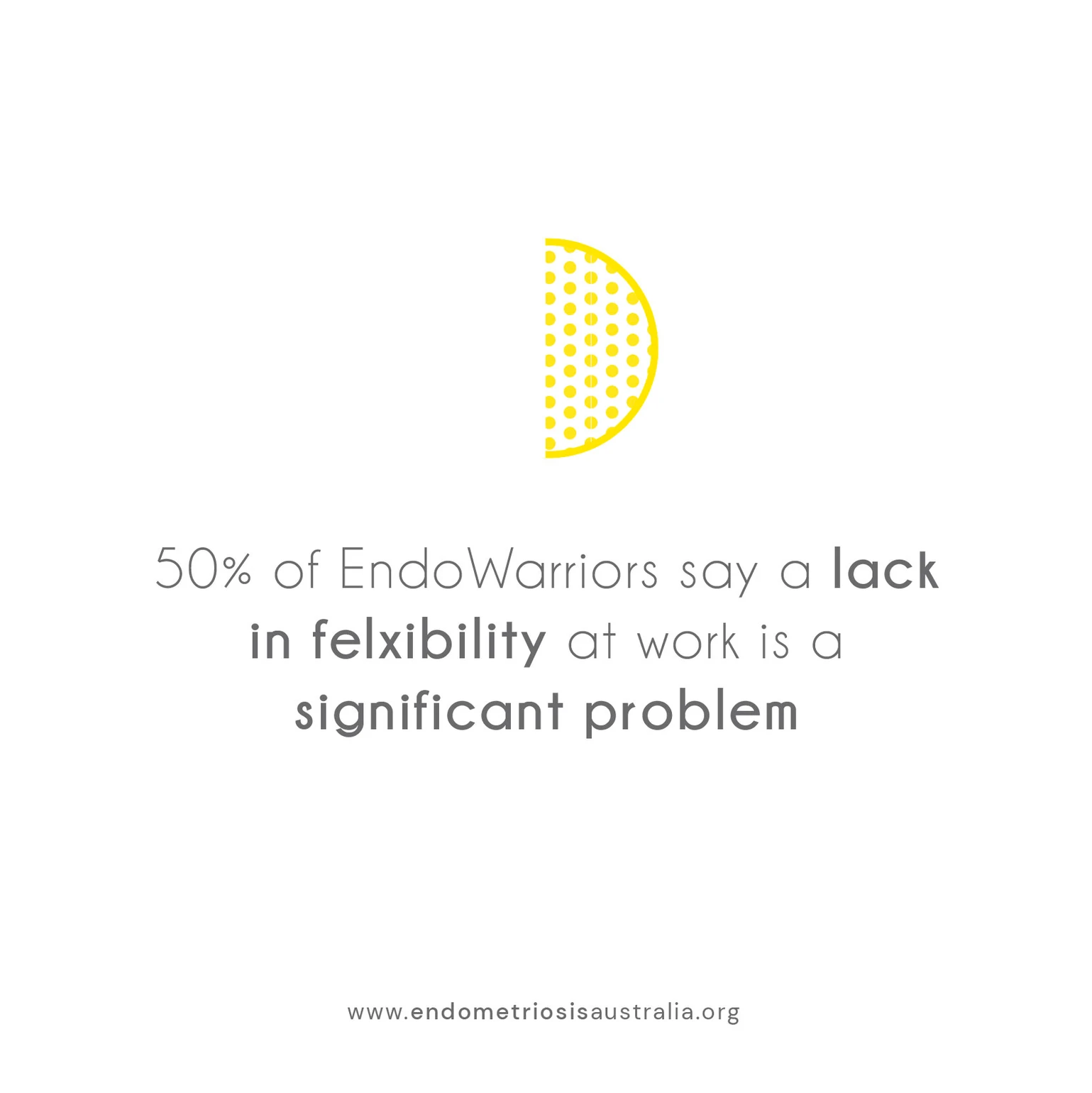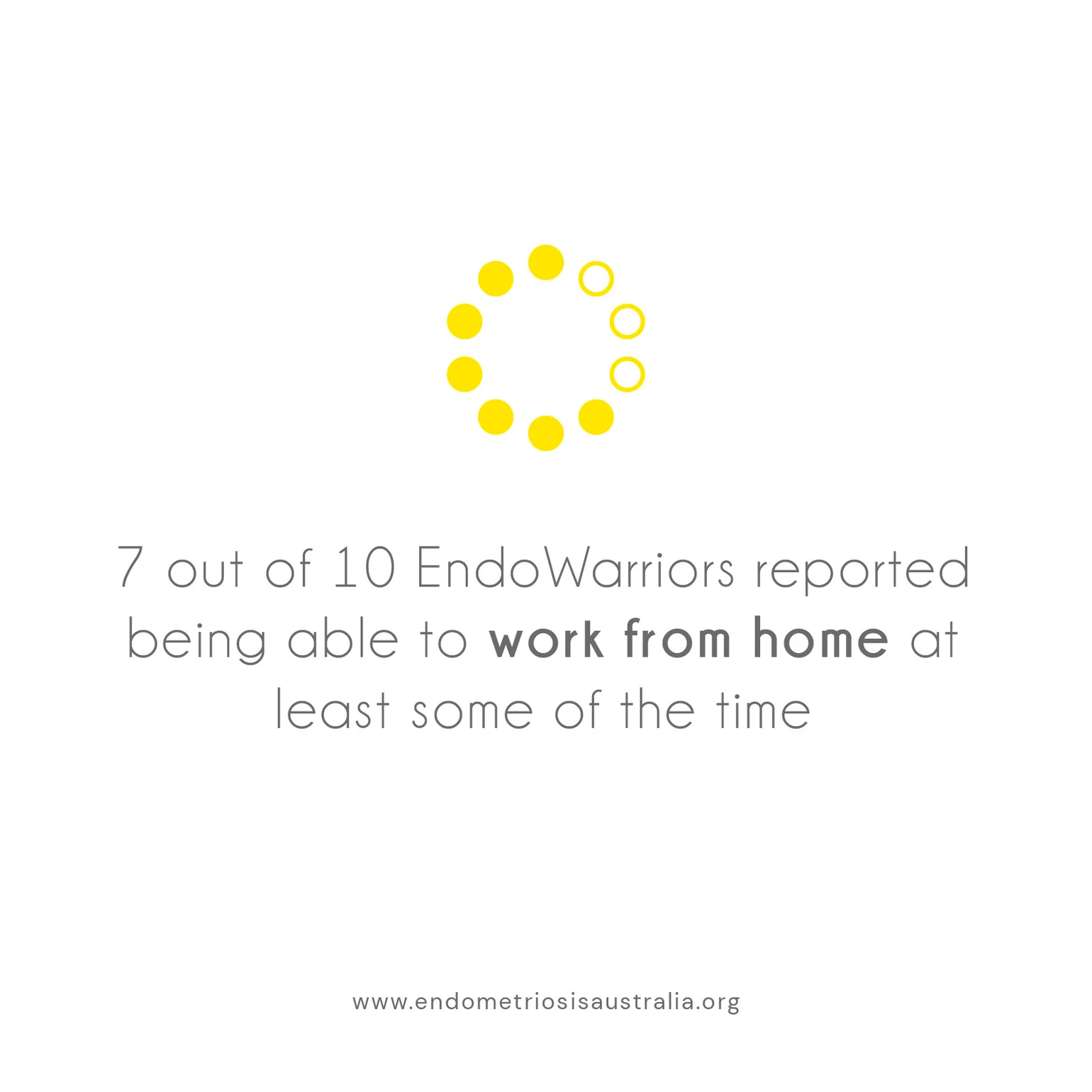I was an early adopter of working from home. Almost a year before the government mandated lockdowns, the scramble to purchase office chairs, and computer monitors – I was logging in remotely to work from home each day. And each day, I have counted myself lucky for being able to do so. I highly doubt I will ever want to go back to working full time from an office.
I’m not alone in enjoying the benefits of working from home. Latest research from Endometriosis Australia found that 80% of respondents, felt that working from home made managing their endo symptoms easier.
I echo this sentiment entirely. For me, some of the main attractions of working from home include the flexibility, proximity to my heat pack and bathroom, and ability to work in track pants. These in turn enable me to more effectively manage my endo, particularly if I’m in a bad flare or for the one week a month where I typically struggle with a painful and heavy period.
When I’m bloated, in pain, or have had a terrible night and relatively little sleep, I can set up office on the couch, or when it is really bad, the bed. I don’t need to worry about my appearance or a dress code, rather I can complete my day with my heat pack or tens machine attached, and manage both work and health demands simultaneously.
Since working from home, I also haven’t had to take any sick days for my period which for me is a first in my working life. My period is relentlessly heavy. Having the ability to change tampons, or wash out period underwear from the comfort of my own bathroom feels like such a luxury.
The flexibility in my current role also allows me to attend medical appointments as needed, take the morning off if I am unwell and make up time as necessary. In other words, I’m able to prioritise my health.
Prior to my working from home escapades, I was working as an executive with a team of 40 odd people. Office hours were 8:30 am to 5 pm and I would customarily stay longer (I’ve never really been a morning person, so I preferred to stay back than get in early). Alternatively, I’d come home from the office, have dinner, then log back on to complete more work.
In the few years before leaving, I was struggling to get diagnosed with endo. After my diagnosis and first surgery, my symptoms were getting worse. I would customarily struggle to get through each day, come home wrecked and have to go straight to sleep. My weekends were spent recovering in bed. My life was work, painkillers and sleep.
In early 2019 I decided to leave my job after over 7 years with the same organisation. For me, it was time to focus on my health and my second surgery had just been scheduled so I knew, rather than rushing back, as I had done after my first surgery, my body needed time to rest.
Looking back now, my decision to leave was one of the best I’ve ever made.
I was fortunate and privileged enough to be able to take some time off to recover properly, and since then (with a bit of respite for yet another surgery) I’ve managed to maintain regular work and some longer fixed-term contracts all of which have been working from home roles.
While I love working from home, it has most definitely been a matter of trial and error in getting the balance right. For anyone who has recently started, or is considering a work from home arrangement, here are some things I’ve found helpful. Note I can’t speak to how my arrangement would work with a little one, as I don’t have children, and I can only imagine how much more of a juggling act that would be.
Having ‘work’ clothes helps (even if they are just your fancy track pants)
Now let me be clear, I’m definitely not advocating for suits, or even jeans, in fact, my work attire consists of track pants, comfy but nice tops and the occasional scarf. But psychologically, changing out of your pj’s or the clothes that you’ve slept in can help put you in a ‘professional’ mindset.
Check you aren’t overloading
While working from home can come with the added benefits of being available for home deliveries, and allow you the opportunity to throw on an extra load of washing during the day (how lucky!) it is important to ensure that you aren’t trying to pack a full day of chores into a full day of work. Just because you are working from home, shouldn’t mean you double your load with other household tasks if possible.
If you can – choose your scenery
When I began working from home, I did so at my dining table. After a few months, I noticed I was getting intense shoulder and neck pain. The purchase of an office chair has helped immensely and I’m lucky enough to have made space for a small office nook.
That being said, most days I’ll spend the morning in the ‘office’, then break for lunch. After that, I’ll spend the afternoon back at the dining table or even the couch. While this might not be the most ergonomic way to approach things, I find sometimes a change of scenery, even within my apartment can help with concentration.
Prioritise your mental health
Mentally, working from home can be tough, even isolating. In the beginning, there were times when I realised I had not spoken to another human being or left the apartment for a couple of days.
When I realised that I was perhaps not building very helpful routines, I focused on things I could do every day that I would enjoy. Given the fact that I save time on commuting, buying coffee, lunch, the incidental chats with colleagues (which I do miss), I started some regular working from home routines.
I try to do an at-home yoga practice at least a few days a week, go outside for a walk every day even just for 20 minutes, listen to a podcast in the mornings while I have coffee and before logging on, and whenever possible try to take a proper lunch break away from my computer. I have also discovered some beautifully curated playlists that keep me company while I work.
Log off
Finally, it can help to separate your working hours from your non-working hours. Once you have finished your work for a day, try to step away from the computer, or the workspace if possible and spend some time un-winding – whatever this might mean for you.
Those are just a few things that have helped me. I recognise that everyone is different and not everyone will have the opportunity, privilege or circumstances to be able to alter their working arrangements to suit their health or needs. However, if possible, perhaps consider how your work is affecting your health, and what small changes might be practical for you.
For all of those reading this and trying to manage work and endo, I salute you, it is no easy task. I hope that you can find ways to manage this disease which can be in itself a full-time job.
Sending love
Rach
XX
Research to be released soon showed that working from home flexibility can significantly benefit EndoWarriors and allows them to increase productivity and better manage symptoms. The below statistics are from said research.
Photography provided by Cole Bennets
Written by
Rachel Burke

